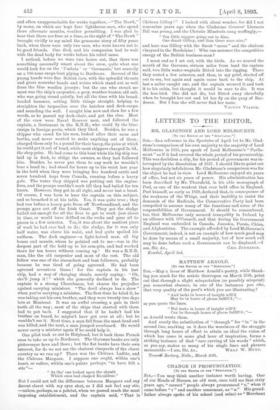LETTERS TO THE EDITOR.
MR, GLADSTONE AND LORD MELBOURNE.
[To THE EDITOR OF THE " SPECTATOR."] Sin,—In a reference in the Spectator of April lst to Mr. Glad- stone's comparison of his own majority to the majority of Lora Melbourne in 1835, you speak of Lord Melbourne's " Parlia- ment " as if it had covered the whole period of his premiership. This was doubtless a slip, for his period of government was in- terrupted by the dissolution of 1837. I should like to point out how singularly infelicitous Mr. Gladstone's comparison was for object he had in view. Lord Melbourne enjoyed six years• of office, but not six years of power. His administration has been described by Mr. Thursfield, in his able monograph of Peel, as one of the weakest that ever held office in England. Peel himself, so early as 1838, declared that, in consequence of the weakness of the Whigs, and their inability to resist the demands of the Radicals, the Conservative Party had been compelled to assume many of the functions and some of the responsibilities of Government. It should be remembered, too, that Melbourne only secured tranquility in Ireland by an alliance with O'Connell, and that during his Government England was embroiled in Canada, Jamaica, Persia, China, and Afghanistan. The example afforded by Lord Melbourne's Government, indeed, is not an example of how much good may be done by means of a small majority, but of how much evil may be done before such a Government can be displaced.—I.


































 Previous page
Previous page